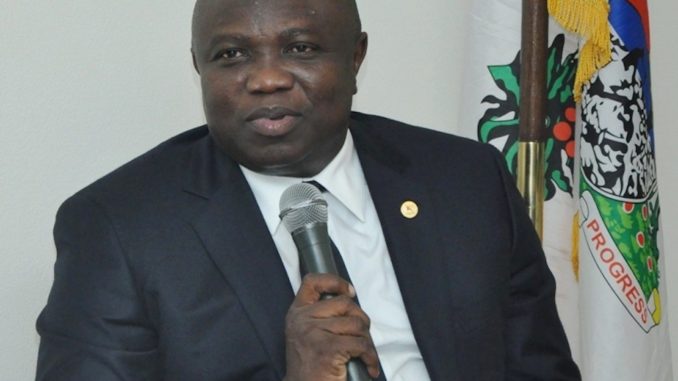
After days of lethargy, the Lagos State Government roused itself from the slumber the other weekend to untangle the traffic chaos that had grounded many parts of the metropolis. Characteristically, the response came by way of a “task force” that had representatives of the federal and state governments, military and police, as well as maritime sector operators and other stakeholders. The problems around the Apapa ports are gargantuan, no doubt, but gridlock has also worsened in the city in recent times. Ambode squarely bears the responsibility to clear the mess.
Congestion or gridlock has been part of the Lagos story for decades, earning this metropolis of 23 million population notoriety for disorder on the highways. In the last three years, however, the modest success achieved in restoring sanity to the highways has been rolled back, giving way to impunity, lawlessness and extortion.
Trucks ferrying refined petroleum products and others laden with containers have rendered travel on the most important highways in the metropolis a nightmare, inflicting hardship on social activities and business. Lawless haulage operators and truck drivers, who have for several years blocked the major access roads to and fro Apapa, home to the country’s major ports, private jetties, bonded warehouses and petrol tank farms, extended their impunity yet again to reach Toyota Bus Stop area on the Apapa-Oshodi-Oworonsoki Expressway. For months, about 2,000 trucks have occupied the highways from the ports back through the Apapa industrial area, to the Ijora and Marine Beach bridges, Ijora-Olopa, right on to Iddo, Oto and Oyingbo. They have restricted access to Costain, Iponri, Ojuelegba on Funso Williams Avenue and further backwards to Ikorodu Road. Perhaps no government, except Nigeria’s alone, tolerates parking of heavy duty trucks on bridges, an irresponsible behaviour that the Nigerian Society of Engineers has warned could lead to a major tragedy as the trucks weaken our inadequate and poorly maintained infrastructure.
Traffic on Lagos roads is becoming unbearable. Laws are broken at will, traffic regulations mean nothing to motorists, especially the mini bus drivers; the notorious “yellow buses” have taken impunity to new heights, helped by complicit policemen, touts and lack of continuous, corruption-free law enforcement. The ban on commercial motorcycles from 475 roads and bridges under the 2012 Lagos Traffic Law has virtually collapsed. Traders evicted from pedestrian bridges are back on some.
To be fair, some of the gridlock results from ongoing major construction and expansion works for which the Ambode administration has received deserved accolades: the government has also invested heavily in equipment, vehicles, technology and morale-boosting programmes for its agencies like the Lagos State Traffic Management Authority, Vehicle Inspection Office and LASEMA. But enforcement of laws has also suffered and Ambode’s undefined enforcement with “human face” on assuming office has been interpreted by many drivers as a licence to throw away the rule book.
Laxity or non-enforcement of the law is unacceptable. Government’s primary responsibility is protection of lives and property through effective law enforcement. Partial or occasional enforcement of traffic laws cannot instil discipline in highway users. Corruption through extortion by security agents also entrenches lawlessness.
The heroic efforts of LASTMA, LASEMA and perhaps a few other agencies make the anguish Lagosians endure bearable. Ambode’s current vigour should start with a directive to law enforcement to commence the ruthless enforcement of traffic rules. Until the “danfo,” “okada” and tricycle operators are tamed, Lagosians cannot enjoy the first world infrastructure the state government is building.
With over 40 per cent of the 11.4 million vehicles the National Bureau of Statistics reported in Nigeria operating in Lagos, traffic management will continue to be a challenge for the emerging mega city. It will not be resolved by mega infrastructure projects alone: law enforcement is a 24-hour, seven days a week, year-round activity to instil a culture of decorum.
Most of the affected roads are federal highways and that tier of government has been irresponsible for years in maintaining the Apapa access roads to the ports and tank farms from which it reportedly earns revenue put at over N1.5 trillion yearly. Instructively, the Federal Executive Council has finally approved N72.9bn for the reconstruction of the neglected Apapa-Oshodi road. Other federal roads should be given urgent attention. The Federal Government should follow through on Vice-President Yemi Osinbajo’s promise to immediately rehabilitate the link roads and its fuel pipelines and depots whose disuse has forced the recourse to tankers besieging Lagos. The Lagos State Government should also embark on the rehabilitation of inner access roads and clear the highways and bridges of traders. The menace of cows on the 475 designated roads should be eliminated through strict enforcement.
The world’s most populous cities deploy law enforcement, road, rail, tram and water transport along with advanced technology to manage traffic. Lagos has invested resources in road and traffic infrastructure and management to the envy of other states; sadly, the impact has been limited by weak law enforcement. Ambode should realise that commendable modern bus stops/terminals, bridges and road expansions will not deliver pleasurable commuting to Lagosians until the law is fully and continuously enforced. Corrupt, extortionist policemen should be removed from the highways.
END

Be the first to comment